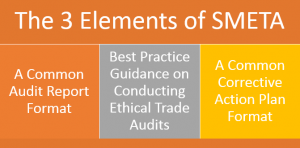
Sedex and SMETA
SMETA is designed to reduce duplication of effort in ethical trade auditing, benefiting retailers, consumer brands, and their suppliers. It was developed in response to member demand for an ethical audit report format that could more easily be shared It is designed so that a supplier can share 1 audit report with multiple customers.
SMETA is not a code of conduct, a new methodology, or a certification process, but describes an audit procedure which is a compilation of good practice in ethical audit technique.
The SMETA documents are designed to be used in conjunction with current established practices by experienced auditors to help them to conduct high quality audits that will be accepted by multiple retailers and brands.
The Supplier Ethical Data Exchange (Sedex) is a not-for-profit, membership organisation for businesses committed to the continuous improvement of ethical performance within their supply chains.
The aims of Sedex are to ease the auditing burden on suppliers through the sharing of reports and to drive improvements in supply chain Labour Standards.
SMETA and the Ethical Trading Initiative (ETI) Base Code


SMETA Best Practice Guidance (SMETA BPG) describes the key steps of planning, executing and documenting a “SMETA audit” against the following four auditing pillars:
A 2 SMETA 2-Pillar Audit Comprises:
A SMETA 2-Pillar audit comprises the 2 auditing pillar of Labour Standards and Health & Safety, and these are mandatory modules for any SMETA audit. It also contains the additional elements of Entitlement to Work, Subcontracting and Homeworking, and a shortened Environment assessment.
- Labour Standards;
- Health & Safety;
- Additional elements of Entitlement to Work; Subcontracting and Homeworking; Environment (shortened).
A SMETA 4-Pillar Audit Contains in Addition:
A SMETA 4-Pillar audit includes all the above plus the additional pillars of Environment (extended assessment – replaces shortened assessment) and Business Practices These additional pillars may not be required for all Sedex members and it is important that sites of employment and auditors are clear when these extra modules are required.
- Environment (extended) – this replaces the environment (shortened version) detailed above and
- Business Practices.
Links: